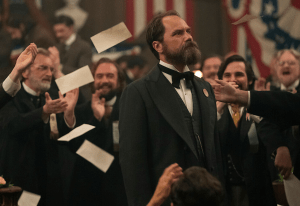An end to the writers’ strike could be getting closer. According to Deadline, the Writers Guild of America (WGA) and the Alliance of Motion Picture and Television Producers (AMPTP) are resuming talks on Tuesday afternoon, via Zoom, with the WGA set to deliver their counter to the AMPTP’s counterproposal from last Friday. Per the report, thus far the tone of recent talks have been progressive with both sides willing to negotiate on key issues, such as viewership-based streaming residuals, pay raises, preservation of the writers’ room, and AI.
Videos by ComicBook.com
Tuesday’s meeting comes after WGA leadership sent an email to members on Friday revealing that a meeting with the AMPTP occurred earlier that day and resulted in a new package of proposals from the studios. The email indicated that the WGA planned to respond to the AMPTP sometime this week.
“We will evaluate their offer and, after deliberation, go back to them with the WGA’s response next week,” the guild told members at that time. “Sometimes more progress can be made in negotiations when they are conducted without a blow-by-blow description of the moves on each side and a subsequent public dissection of the meaning of the moves. That will be our approach, at least for the time being, until there is something of significance to report, or unless management uses the media or industry surrogates to try to influence the narrative.”
Talks Between the WGA and the AMPTP Have Only Recently Restarted
After months of no talks, earlier this month it was reported that WGA chief negotiator Ellen Stutzman and WGA West general counsel Tony Segall met with the AMPTP, but a potential deal was stalled over two key issues. According to the reporting on the meeting, the biggest issues to remain after the meeting concern episodic television, particularly minimum staffing levels and a guaranteed minimum number of weeks of employment. The AMPTP reportedly still views the WGA’s proposals on those topics “non-starters.”
The reporting also revealed that the SAG-AFTRA actors’ strike, which began last July, is further complicating the negotiations. Reportedly, Stutzman and Segall told the AMPTP that even if a deal is closed with the WGA, the writers will not start work until both strikes are resolved.
SAG-AFTRA Has Also Updated Their Interim Agreement Policy
On Monday, it was reported that in solidarity with the WGA, the actor’s union SAG-AFTRA modified its interim agreement policy for independent projects. The modification will exclude projects shot in the U.S. and covered by the WGA, though the 200+ productions that have signed interim agreements with the actors’ union will remain in effect.
“The Interim Agreement is an important element of our strike strategy,” the SAG-AFTRA Negotiating Committee said in a statement Monday. “We will now exclude from Interim Agreements any WGA-covered project to be produced in the USA. We have been advised by the WGA that this modification will assist them in executing their strike strategy, and we believe it does not undermine the utility and effectiveness of ours. It is a win-win change.
“This means that, going forward, for productions taking place in the USA, SAG-AFTRA will only grant Interim Agreements for non-WGA-covered projects. And our staff will continue to investigate each application for an Interim Agreement to ensure only true independent productions are included.”
Why Are the Writers on Strike?
The WGA have cited a slew of reasons for the strike, which began on May 1st , including issues involving residuals from media streamed online, as well as additional benefits and safeguards against artificial intelligence potentially being used to write stories instead of real writers.
“Though we negotiated intent on making a fair deal — and though your strike vote gave us the leverage to make some gains — the studios’ responses to our proposals have been wholly insufficient, given the existential crisis writers are facing,” the WGA said in a statement on May 1st. “We must now exert the maximum leverage possible to get a fair contract by withholding our labor.”
The statement continued: “The WGA Negotiating Committee began this process intent on making a fair deal, but the studios’ responses have been wholly insufficient given the existential crisis writers are facing. The companies’ behavior has created a gig economy inside a union workforce, and their immovable stance in this negotiation has betrayed a commitment to further devaluing the profession of writing. From their refusal to guarantee any level of weekly employment in episodic television, to the creation of a ‘day rate’ in comedy variety, to their stonewalling on free work for screenwriters and on AI for all writers, they have closed the door on their labor force and opened the door to writing as an entirely freelance profession. No such deal could ever be contemplated by this membership.”








